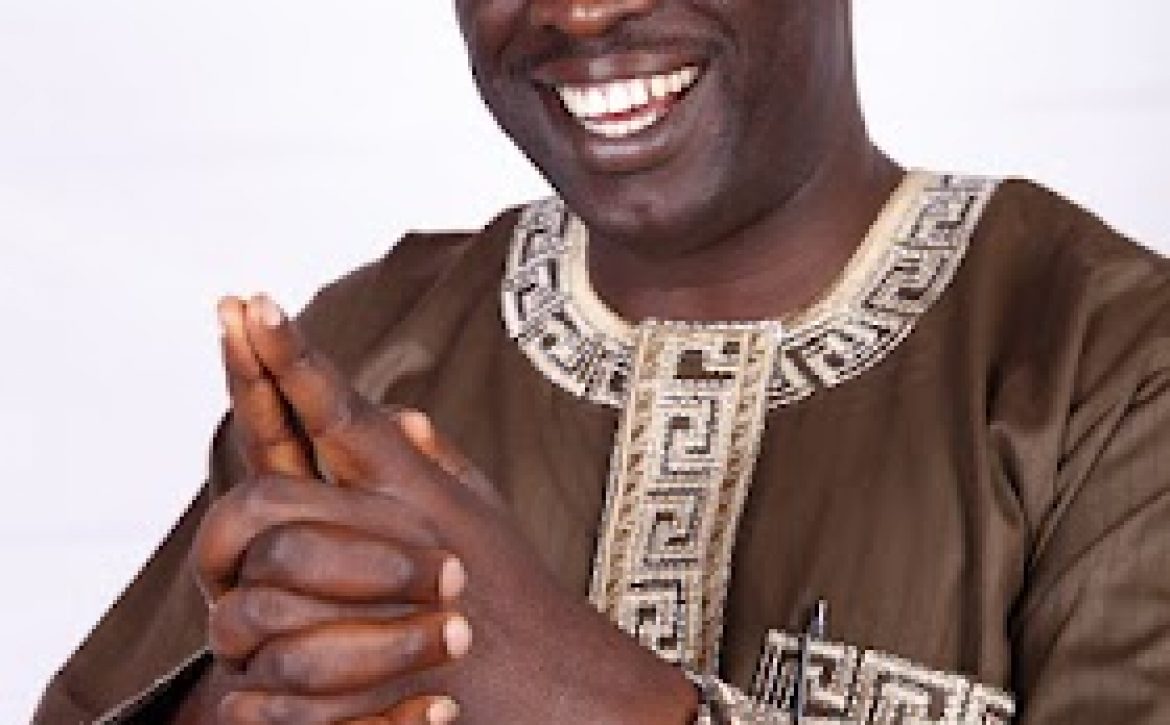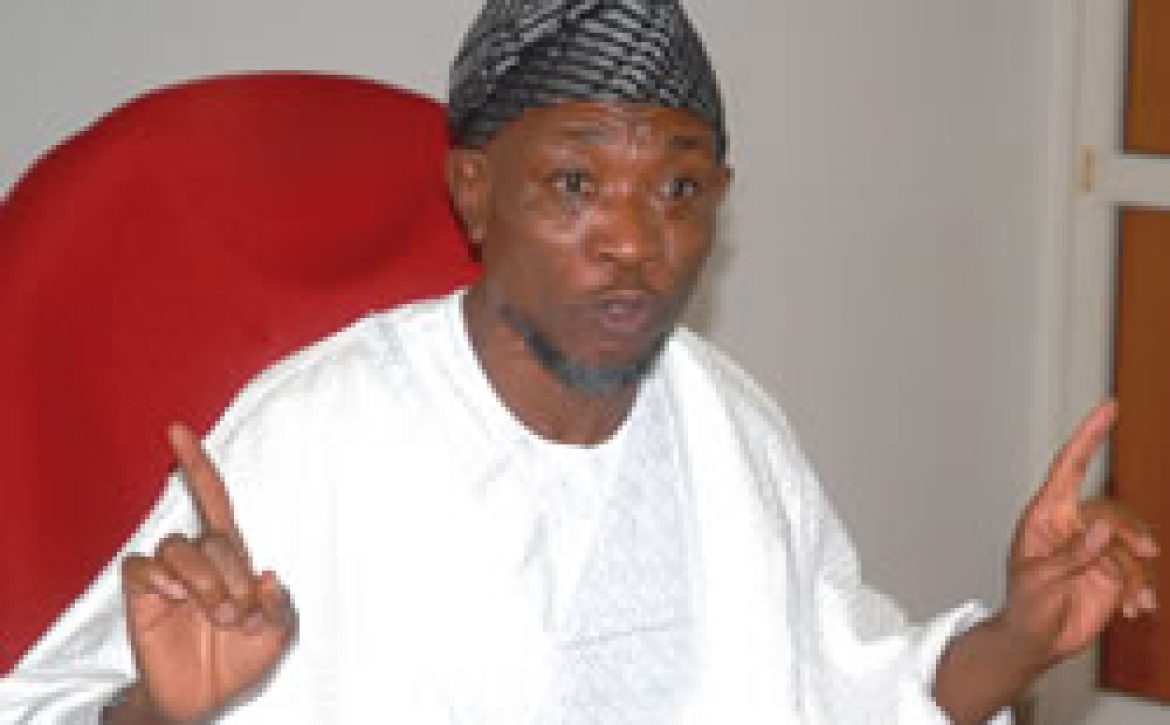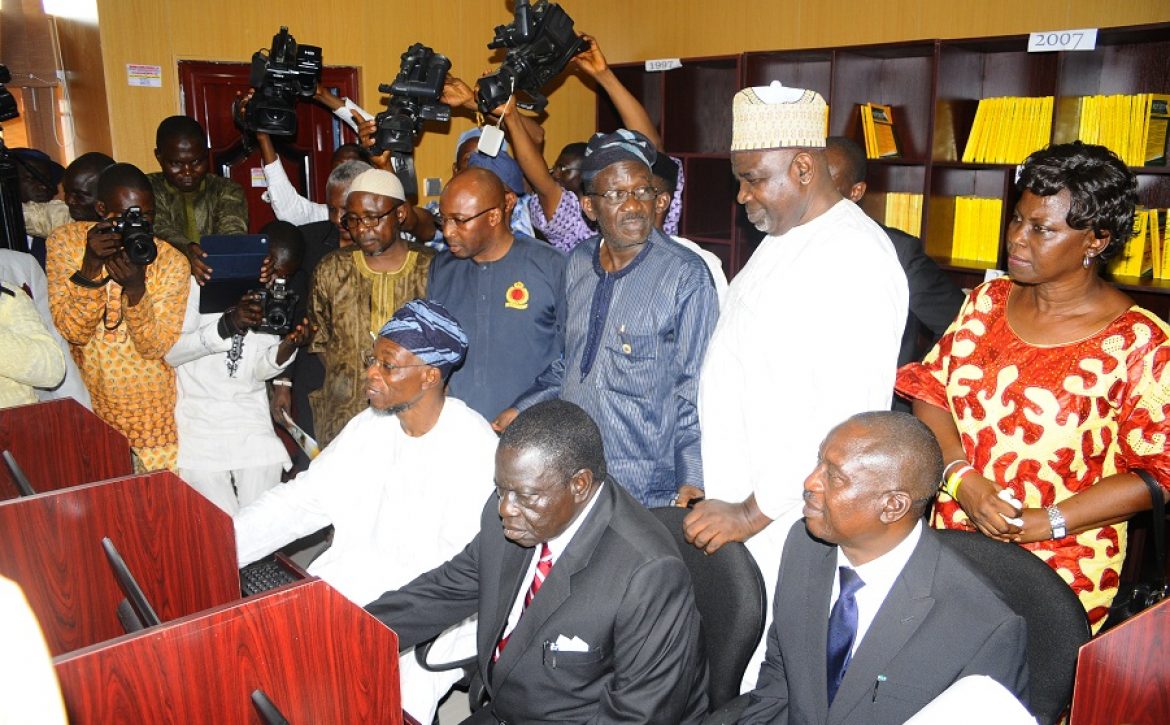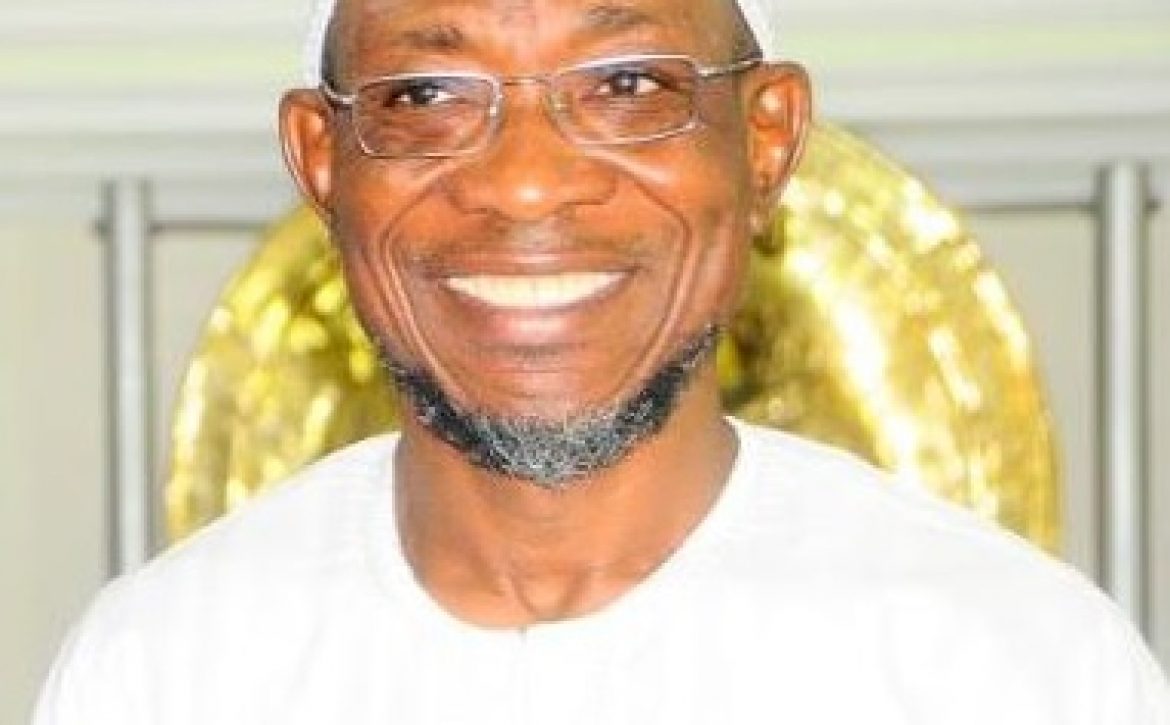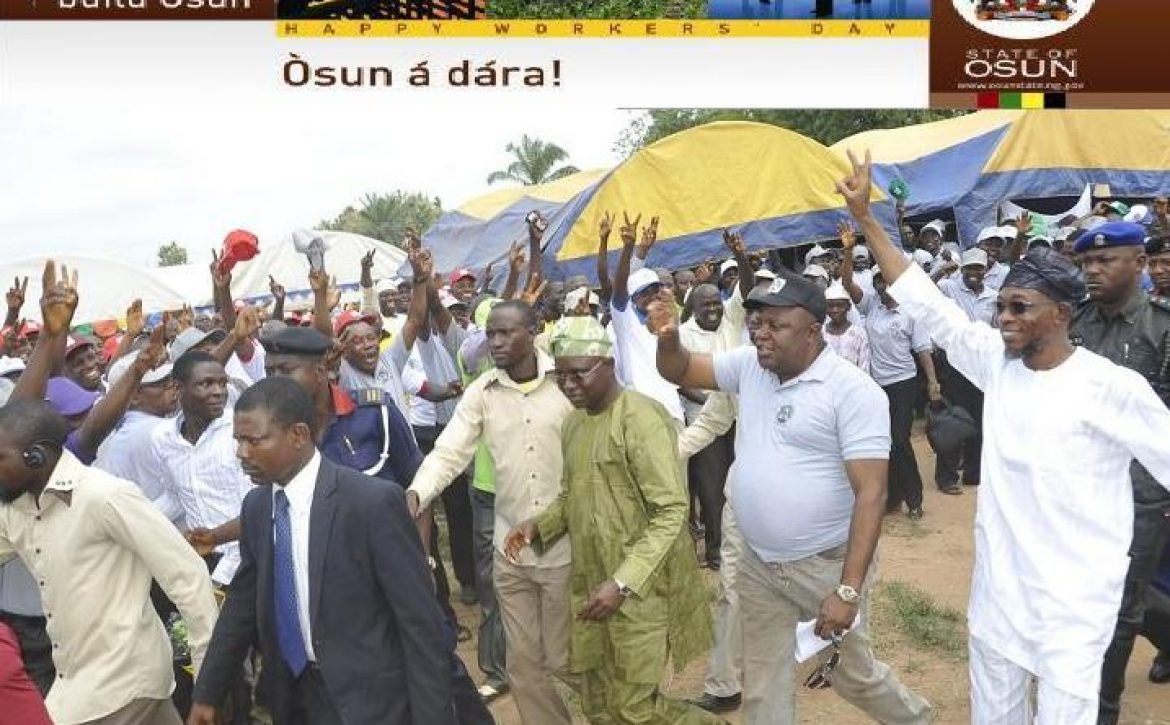 The Special Adviser to Governor Rauf Aregbesola on Environment and Sanitation, Mr Bola Ilori, has solicited for more support for the current administration, just as he congratulated the people of the state on the third year anniversary of Aregbesola’s administration.
The Special Adviser to Governor Rauf Aregbesola on Environment and Sanitation, Mr Bola Ilori, has solicited for more support for the current administration, just as he congratulated the people of the state on the third year anniversary of Aregbesola’s administration.
Describing November 27 as an historic day in the political history of the State of Osun, Ilori portrayed the three years administration of Aregbesola as a period of good governance, where government is responsive to the plight of the people.
Ilori, who spoke with OSUN DEFENDER in an interview on Thursday in Osogbo, said that the people of the state have not had it so good in recent time, when it comes to dividends of democracy, until Aregbesola took the mantle of leadership of the state.
He said: “Aregbesola is indeed a blessing to the State of Osun, going by what we are witnessing today. In just three years, infrastructural developments are massive, road constructions are going on in all nooks and crannies of the state.
“Efforts on cleaner environment have reduced hospital patronage for diseases-related cases by 50 per cent, face-lifting of our environment through urban renewal programme is on, farmers are getting soft loans and other inputs to carry on their businesses.
“No single case of flooding has been reported since the government started dredging of streams and rivers in the flood-prone areas when it came on board, schools are being constructed everywhere, enabling environment is being created for investors.
“Jobs are being created, modern markets are being built and a whole lot more like that. The governor has indeed done well and we can only continue to pray for him for more success.”
Ilori then called on the people of the state to give more support to the governor, saying that it is the only thing that can guarantee continuous enjoyment of the dividends of democracy.
“As 2014 approaches, which is the election year, we are urging our people to continue with their unflinching supports for Ogbeni, so that we will all continue to enjoy the ongoing dividends of democracy like never before,” he said.
OSUN DEFENDER
Category: Politics
 Globally, organizations, in both private and public sectors of the economy, draw budget to attain specific goals and objectives. However, while budgeting in the private sector is market driven and profit oriented, the contrary is the case in the public sector.
Globally, organizations, in both private and public sectors of the economy, draw budget to attain specific goals and objectives. However, while budgeting in the private sector is market driven and profit oriented, the contrary is the case in the public sector.
The public sector is not only resource constrained (as it is funded mostly by taxation) but is also service oriented. Hence government at various levels often ensure that budget is well prepared in advance in order to render service to the people especially under a democratic dispensation in which citizens expect so much from their leaders who they elected into office.
In the State of Osun, a forward looking and progressive brand, the art of budget making has been taken to greater heights. Under the leadership of Rauf Aregbesola, the regime has not only touched the lives of the people with the execution and implementation of its 6 points agenda, it has also turned the economy of the state around.
Without foisting a higher tax regime on the people, the states Internally Generated Revenue (IGR) has increased by 100 percent. According to Dr Wale Bolorunduro, Commissioner for Finance, Economic Planning and Budget, “The approach we adopted was to plug loopholes and stopped the losses incurred through manual collection and manual processing. The approach paid off with 100% jump in revenue earnings.”
Yet in spite of this laudable feat, the State is not resting on its oars. Perhaps in affirmation of Aregbesola’s vision as enunciated in this words: “The development of human capacity is the most important responsibility of any serious government; we are treading this course progressively” the State recently held a week long workshop on Budget Preparation for senior civil servants in the state. The workshop which held between October 28 and November 4, 2013 was co-ordinated by Landmark Exposures Limited, the management excellence advocacy firm.
The maiden workshop was a joint initiative of Ministry of Human Resources and Capacity Building and the Ministry of Finance, Economic Planning and Budget.
In her opening remarks, the Commissioner of Human Resources and Capacity Buildings, Mobolaji Akande admonished the participants thus: “Your role is important as officials in charge of budget preparation. Budgeting strategy should be geared towards the achievement of the 6 points agenda of Ogbeni Rauf Aregbesola. Therefore this workshop is expected to expose participants to the global best practices in budget preparation, initiation an implementation. Moreover, this workshop is timely because it is coming up during the budget preparation season. All what you learnt here would help you in the preparation of the 2014 budget.”
Participants at the workshop were top and middle level executive staff with diverse background in charge of budget preparation in various ministries, parastatals, agencies and departments.
Presenting the opening paper, the faculty leader and chief executive officer of Landmatk Exposures Limited, Mr Akinwole Osewa, described the participants as the engine room of government. “As civil servants, you are the souls and heartbeats of any government”, Osewa said. According to the seasoned management consultant the success and failure of any government or regime could be gleaned from the impact of government’s budget on the lives of the governed stressing that “civil servants who are involved in the making of budget should ensure that budget prepared by them are strictly implemented by those involved in its execution.”
A global financial management trainer, forensic accountant and author, Dr Richard Mayungbe took the participants through the whole gamut of budget making and preparation at the workshop. Mayungbe said since budgeting starts and ends with human beings it is imperative that those involved in its preparation should not only be well trained but also motivated.
Mayungbe stressed that a well prepared, well implemented and executed budget must touch the lives of all the stakeholders.”
With both local and foreign instructive and thoughtful case studies, he took participants through issues and pivots in the budgeting process. Topics like, budget cycle and control, contents and structure of public sector budget, budgeting and responsibility accounting, driving IGR with ICT and other germane issues.
In his presentation titled “Emotional intelligence for effective budgeting and budget implementation” a renonwed motivational and entrepreneurship speaker, Dr. Lemmy Omoyinmi, focused on how emotions of executives in charge of budget preparation and implementation affects the lives of stakeholders the budget is meant for.
Adopting philosophical, psychological, medical and sociological models to dissect the problem of poor service delivery in the public sector, Omoyinmi said the only way to remedy the situation was to stop living historically but futuristically as futuristic thinking evokes positive energy needed for development and growth.
THISDAY
 Governor of the state of Osun, Mr. Rauf Aregbesola, yesterday, declared that his administration will not tolerate any act of lawlessness from any group or individuals irrespective of their standing in the society.
Governor of the state of Osun, Mr. Rauf Aregbesola, yesterday, declared that his administration will not tolerate any act of lawlessness from any group or individuals irrespective of their standing in the society.
Aregbesola made this disclosure during the graduation of 410 Osun Youth Empowerment Scheme, O’YES, cadets trained at the OSUN-ODU’A Farmer’s Academy at Ede.
Aregbesola, who described the attack on the Principal of Ejigbo School of Science as unacceptable, noted that no one is allowed by the constitution to take laws into one’s hands.
He stressed that henceforth the government will not treat such cases with kid gloves, saying that anyone caught with such uncivilised act will be made to face the law.
Speaking to the graduates, the governor said his administration’s involvement of youths in agricultural enterprises was another way his administration was tackling the menace of youth unemployment.
The graduation ceremony, he noted, was an opportunity to hoist aloft for all to see the “fruits of responsive and responsible governance that only the healthy tree of focused and visionary leadership can yield.”
CULLED FROM VANGUARD
Pictures from the Commissioning and Inspection of Sir Sapara Williams Law Library, in the Ministry of Justice, State Secretariat, Abere via Osogbo, State of Osun on Friday

Governor State of Osun, Ogbeni Rauf Aregbesola (3rd left first row);
Attorney General and Commissioner for Justice, Barrister Wale Afolabi
(left first row); Justice Adebisi Ogunlade representing the State
Chief Judge (2nd right first row) and others, at the Commissioning and
Inspection of Sir Sapara Williams Law Library, in the Ministry of
Justice, State Secretariat, Abere via Osogbo, State of Osun on Friday
29-11-2013

From right, Attorney General and Commissioner for Justice, Barrister
Wale Afolabi; Governor State of Osun, Ogbeni Rauf Aregbesola and
others, during the Commissioning and Inspection of Sir Sapara Williams
Law Library, in the Ministry of Justice, State Secretariat, Abere via Osogbo, State of Osun on Friday 29-11-2013

Governor State of Osun, Ogbeni Rauf Aregbesola (sitting); Attorney
General and Commissioner for Justice, Barrister Wale Afolabi (4th left); Assistant Chief of Staff, Legal Matters, Barrister Gbenga Akano
(3rd left); and others, during the Commissioning and Inspection of Sir
Sapara Williams Law Library, in the Ministry of Justice, State
Secretariat, Abere via Osogbo, State of Osun on Friday 29-11-2013

Governor State of Osun, Ogbeni Rauf Aregbesola (sitting); Attorney
General and Commissioner for Justice, Barrister Wale Afolabi (3rd
right); Assistant Chief of Staff, Legal Matters, Barrister Gbenga
Akano (4th right); and others, during the Commissioning and Inspection of Sir Sapara Williams Law Library, in the Ministry of Justice, State
Secretariat, Abere via Osogbo, State of Osun on Friday 29-11-2013
On my part, I have always maintained that this requirement of Awolowo is very hard to come by for, as I see it, there are only three people who fulfilled this stoic requirement in a fell-swoop. They are Plato, Mahatma Ghandi and Awolowo himself. I do not know of any person who can be called an Awoist in this stoic sense. If we take this as Awoist in the strong sense, we can at least find an approximation to an Awoist in the weaker sense. This is precisely where Rauf Aregbesola comes in as a man whom the cap fits naturally. Of course, there may be others, but they are likely to be those whose heads had been carved to fit an ideal cap, which is not natural. I believe it is generally known that Aregbe is sexually continent, abstemious in food, abstaining from alcoholic beverage and tobacco, and may be said to vanquish, if not completely, the emotion of greed and fear. I, like many other admirers of Awo, cannot claim to have passed this stoic test to be called an Awoist in the true sense of the word.
That Aregbesola has passed this Awoist test with high grade is by no means a mean feat that puts him nearer to Plato, Mahatma Ghandi and Awolowo than many of us in this regard. I think I should disarm any criticism by making it clear that my assessment was based on empirical evidence that is open to everybody to verify. Congratulations, Ogbeni Rauf Aregbesola, for it has been confirmed that you actually were sexually continent even before your marriage till today, and you neither smoke nor drink alcohol like the famous Gulder which many of us patronise. These certainly are notable areas where many of us who want to be called Awoists, including the present writer, have not made it, as “Baba Kekere” has done, most creditably.
Merely wearing a cap which looks like the one Awo used to wear, or his spectacles (both in imitation of his mentor, Mahatma Ghandi), does not make one an Awoist or a Ghandist. We are not even sure whether to also call it Ghandi or Nehru cap or both! By my reckoning, Awolowo had put away the cap called “Awo cap” after his death. Notice that he did not start wearing that cap as a leader of the Action Group or the Premier of Western Region. Along the way, he fell in love with Mahatma Ghandi’s style of dressing and found the cap easy to fix on his head without necessarily looking at the mirror. It was also part of Ghandi’s simplicity, like the spectacles. In my dream which led me to do his wish by serialising my last conversation with him in The Nation newspapers, and later published by Evans Brothers (Nigeria Publishers) Ltd in 2010, I saw Awolowo not wearing the Awo cap but a conventional, multicoloured Yoruba cap over an immaculate white agbada. Neither did he put on the simple Ghandi-like spectacles he used to wear when he was alive. Aregbe neither wears an Awo cap nor Awo spectacles which have nothing to do with the human nature. He simply embraced the spirit and doctrine of Awoism to the letter without the extraneous cap or spectacles.
On the issue of self discipline, Awolowo had this much to say. “Men of affairs and wisdom everywhere are unanimous in the view that only those who are masters of themselves become masters of others. Indeed Aristotle has said it, with the authority of one of the greatest and wisest men that ever lived. ‘Let him that would move the world first move himself’”. The fact of the case is that, for any person to be able to discipline others, he himself must first be self-disciplined. All the corruption going on in the country, especially at the national level, is a product of a violation of Awolowo’s idea of discipline. A leader is not likely to be at a vantage position to discipline his lieutenants on charges of corruption if he is corrupt himself. In this case, Awolowo has sold the idea of self-discipline to our leaders if they must not be afraid to discipline corrupt officials under them unless, of course, they are themselves corrupt, in which case corruption will continue to spread and flourish in the absence of self disciplined leaders. A report has it that, from his ascetic way of life, Aregbesola is difficult to convince when it comes to free spending or corrupt tendency. What he does not do you just can’t do it, and this has led to accountability and transparency in his government about which his lieutenants are happy because they are not greedy and so are ready to make some sacrifice for an Omoluwabi in an Omoluwabi state. Self-discipline is the magic by which Aregbe functions as executive governor of his state.
Awolowo has said about God and Religion: “The touchtone of what is good, be it thought, or word or action, is LOVE. We are to love our neighbours as ourselves. Anything therefore-any thought or word or action-which falls short of LOVE is evil, and holds within itself the germ of its own eventual and inevitable destruction.” Awolowo’s idea of “spiritual depth” involves the notion of God from whom love ultimately flows. Since he has argued that man is made in the image of God, so must our love satisfy that of the Biblical injunction, “Love your neighbour as thyself”, or the Golden rule, “Do unto others as you wish them do unto you”. It was therefore not a surprise that Awo was the first politician to establish a Muslim Pilgrims’ Welfare Board in Nigeria, although he was a Christian. Awo’s action was a good example of religious tolerance. Thus we see Aregbesola’s position on religion in the State of Osun as a follow-up to Awo’s stand on religious tolerance where Christians and Muslims would live together in peace and harmony under the religious injunction “Love thy neighbour as thyself”.
On education, Awolowo writes: “The cardinal aim of education is not, as is popularly but narrowly conceived, to teach a man to read and write, to acquire a profession, to master a vocation, or to be versed in the liberal arts. All these are only means to the end of education which is to help a man to live a full, happy and triumphant life.” Now, people have talked about Aregbesola’s revolution and re-organisation in Osun’s educational system. One of the most recent is the introduction of Opon imo and what, in the like of the American philosopher of education, John Dewey, we may call education “learning by doing” – all of which is to help people to acquire theoretical and practical knowledge in order to live fulfilled, happy and triumphant lives. I am aware that Aregbesola is contemplating a proclamation about technological revolution in Osun, in the manner of the wisdom and foresight of the Emperor of Japan in 1870 in a proclamation and oath taken by him which said that knowledge must be sought and acquired “from any source with all means at our disposal”, an oath that led to Japan’s technological revolution in the areas of automobile and electronic technologies now far ahead those of USA and Germany. Hence, Aregbe’s philosophy of education as learning by doing, and acquisition of high technologies by any means as well as by scientific intelligence are worthy of praise.
Awolowo was seen as a workaholic politician and statesman. This was demonstrated in one of his writings: “I have never regarded myself as having a monopoly of wisdom. The trouble is that when most people in public life and in the position of leadership and rulership are spending whole days and nights in clubs or in the company of men of shady character and women of easy virtue I, like a few others, am always at my post working hard at the country’s problems and trying to find solutions to them. ONLY THE DEEP CAN CALL TO THE DEEP”. Those close to Aregbesola know him well as a man not given to night clubs or found in the company of “women of easy virtues”, but always in his office, days and nights, trying to find solutions to the problems of his state. His appointees find it tough to cope with his work habit, stretching from morning to about 3 a.m the following day. One does not know where he got his energy from to serve his state ferociously as he does. The interesting thing is that he seems to be enjoying it all.
Surely, if there is any politician who may be seen as an Awo incarnate in his Philosophy, Ideology and art of Good Governance, it is Aregbesola whose First Lady is hardly visible. Grown and properly brought up in the politics of the Action Group in those days by a father who was one of the greatest disciples of Awo in Ikare in Akokoland, Aregbesola did not disappoint his father who must be very proud of him wherever he is now. Rather, he surpassed his father in love and passion for the immortal Awo who was a mentor to both father and son. He has even taken a step further by immortalising his mentor and that of his father by founding the Awolowo Centre for Philosophy, Ideology and Good Governance in his (Awo’s) image, and most certainly for posterity.
I cannot end this piece without mentioning the recent commendation on Aregbesola for “sterling performance” from a powerful source – the Sultan of Sokoto – who said, “Aregbesola has been performing commendably well in the past three years”. The Sultan who said he had visited Osun four times said he was elated by what he saw on ground, expressing his willingness to visit the state again. He told members of the Nigeria Governors’ Forum who paid him a courtesy visit in his palace, “My brother, Rauf Aregbesola, is here with all of you. I was in Osogbo, his state capital, sometime this year. I think I have visited his state four times and I am willing to visit again. There is no doubt he is doing wonderfully well” (The Nation, Sunday, Nov 17, 2013, p.9). I hope the spirit of Awolowo and Awoism, otherwise known as Democratic Socialism, may long endure in the State of Osun even after Aregbesola might have left the scene.
Congratulations, on the third year of your meritorious administration in the Omoluwabi State.
– Makinde, a Professor of Philosophy, is the DG/CEO, Awolowo Centre for Philosophy, Ideology and Good Governance, Osogbo
THE NATION
The Governor of the state of Osun, Ogbeni Rauf Aregbesola today announced the increment of the 13th month salary from 50% to 100% just as the number of car loan beneficiaries was increased from former highest figure of 2,189 to about 10,000.
The Governor made the announcement today ( Friday)in Osogbo to the delight of workers present at the official flag -off of the distribution of vehicle refurbishing loan to public servants in the state held.
He said that the ceremony is a further demonstration of the commitment of the administration to the overall welfare of the people in general and workers in the state in particular, noting that it is gratifying that the occasion coincides with the ongoing celebration of the administration’s three years in office.
The Governor ,who said the administration in a bid to keep to its electioneering promises by touching almost every aspect of human life ranging from public service, education, agriculture, commerce, transportation, industry among others ,stated that it is unprecedented in the history of the state to give vehicle refurbishing loan to an unprecedented number of beneficiaries at unusual rates running into billions of naira.
The Governor stated further that in keeping to the vow of improving the lots of workers in the state, the government decided to reinvigorate the scheme which is why the rate loanable was increased geometrically with a view to ensuring that the number of beneficiaries increases and that they derive the maximum benefit from the loan.
According to the Governor, the monthly government subvention to the fund was increased by 100%from 10million to 20million Naira and the rates available for workers were also jerked up thereby increasing the loan obtainable by workers on grade levels 1-3 from 100,000 naira to 170,000 naira, those on grade levels 9 – 10 increased from 250,000naira to 400,000naira while those on grade levels 16- 17 had theirs increased from 500,000 naira to 750,000 naira.
While stating that the total amount of the loan had been increased from #2.8billion to #4.5billion, Ogbeni Aregbesola said that the loan will spread across the entire public service, including government ministries, departments and agencies, secondary and primary schools and has been structured in a way that beneficiaries have the opportunity to pay back over a period of five years at a uniform administrative charge of 10percent spread thinly over the period.
He then assured the generality of workers that the administration will not relent in its efforts at ensuring that their welfare takes the pride of place saying that as part of efforts in ensuring this, the administration has constituted the Civil Service Commission and other bodies whose duties are primarily to ensure the welfare of public servants.
While charging workers to reciprocate government gesture by showing more commitment, loyalty ,and hard work and manifest the virtue of Omoluabi ,the Governor appealed to market men and women not to see the gesture as a means of exploiting the workers through undue and unwarranted increase in the prices of commodities saying that the programme is not a wage increase but a loan to be repaid.
He also urged the workers to be neutral and committed to the service to the people and ensure that government policies are executed accordingly.
In an address, the state chairman of the Nigeria Labour Congress, Comrade Saka Adesiyan lauded the Governor’s intervention in the sector saying it is aimed at bringing sanity to the education sector. He decried the ugly incident which took place in Ejigbo stressing that it is highly unfortunate.
He then appreciated the Governor for the transparent manner in which the car refurbishing loan was done.
Also speaking, the duo of the Chairman of the Trade Union Congress, Comrade Frances Adetunji and his counterpart in the Joint Negotiating Council, Alhaji Bayo Adejumo thanked the Governor for keeping the various promises made to the workers.
They then pledged the continued support of all workers in the state for the present administration.
Earlier in a welcome address, Commissioner for Finance and Economic Planning, Mr Wale Bolorunduro explained that necessary steps that will prevent fraud that may be associated with the manual process overseeing the loan scheme has been taken saying that no case of double payment will be experienced.
Highlights of the occasion was the official presentation of cheques to some of the beneficiaries of the loan scheme by the Governor.
Present at the ceremony were the state Deputy Governor, Mrs Grace Titi Laoye Tomori, the three labour leaders in the state, state executive members and workers in the state.
OSUN DEFENDER
The Osun Government has resolved to buy no fewer than 100 water tankers for the distribution of water to residents, pending the repair and replacement of damaged old pipelines.
Mrs Tawakalitu Williams, Special Adviser to Gov. Rauf Aregbesola on Water Resources, disclosed this to the News Agency of Nigeria (NAN) in Osogbo on Friday.
She said 100 tankers would be purchased for a start, and an order had been placed for them.
“Gov. Rauf Aregbesola approved the purchase following the report that about N10 billion would be required to repair the old and damaged pipelines laid 30 years ago,’’ the Special Adviser said.
She said the governor was very passionate about the plight of the people and had been desirous of providing potable water for them to avert the risk of water-borne diseases.
NAN reports that restoration of healthy living is one of the state government’s six-point Integral Action Plan to eliminate poverty, unemployment and hunger, and promote education and communal peace.
Williams had said the government would provide the tankers for adequate water supply while efforts were being made to carry out a total overhaul of the distribution network.
“The tankers will be operated by the water tanker operators to enhance water distribution, as well as to empower the operators.
“This does not mean that the pipeline network will not be replaced or extended.
“The use of water tankers is a temporary intervention approach to allow for the gradual replacement of the damaged pipelines,” she said.
PUNCH

Governor of the state of Osun, Ogbeni Rauf Aregbesola says his administration will not tolerate any act of violence and any other immoral act that can cause chaos and bring the state to disrepute. Ogbeni Aregbesola gave the warning in Ede at the official launch of the Omoluabi boys and girls club and the Omoluabi youth club jointly put together by the Ministry of Youths, Sports and Special Needs and the Ministry of Women and Children Affairs.
The Governor ,who declared that the Omoluabi Boys and Girls club is for the ages of 12 and 17 and the Omoluabi Youth club is for between the ages of 18 and 35 ,described the youruba culture as rich in values that teaches morals and warned the people against fighting in thebname of any religion to disrupt the peaceful atmosphere being enjoyed in the state.
According to him, the reason for organising the clubs is to build confidence in the children and the youths and engender tolerance, harmony in faith and ethics of yoruba culture and values.
He also stressed that the club would be used to generate a culture of ethical values that would bring about positive change which the present administration desires.
Ogbeni Aregbesola ,who emphasised the need to train the youths properly said that no matter the investment by a government on infrastructure, if the moral of the people is not invested in, it will be in vain because uncultured people will destroy any good thing that the government might have done.
The Governor stressed that there is the need for the continuous cultivation of the human mind to generate good deeds noting that it is for this reason that the administration has taken the OMOLUABI concept very seriously from the first day of the administration in office.
He said it is necessary to create a society of virtuous and progressive people rather than one of delinquents and retrogressive elements observing that the best way to do this is to begin from the cradle saying that the studies of socialisation and culture affirm that civilisation actually begins from birth.
The Governor said that the yoruba people have some of the best cultures in the world which is rich in positive values and virtues on which the Omoluabi ethos is central.
While stating that the clubs would exist in all the local government areas and the Ife East Area Office,the Governor enjoined all traditional rulers to help in nurturing the clubs in their domain.
Delivering a keynote address at the event, renowned yoruba playwright and author, Prof. Akinwumi Ishola explained that the greatest asset which the Yorubas have that can be sold to the entire world is the Omoluabi virtue which God has naturally deposited in the yoruba man.
While noting that the yoruba language is one of the most respected languages in the world which should not be allowed to go into extinction, Prof. Akinwumi enjoined members of the club to dream about good things and always work towards achieving it in a positive way.
Earlier in a welcome address, the Commissioner for Youths, Sports and Special Needs, Mr Steven Kola Balogun observed that youths are the greatest assets a nation can have hence issues concerning youths should be taken seriously at all times.
He said the coming into being of the Omoluabi clubs is to train the youths in good character development and become change agents in their various communities.
The Commissioner then enjoined the people to cooperate with the government in seeing to the success of the lofty idea.
In attendance were the first lady in the state of Osun, Alhaja Serifat Aregbesola, the state Deputy Governor, Mrs Titi Laoye Tomori, APC party chieftains, Royal Fathers including the Timi of Ede land as well as members of the state executive council.
OSUN PORTAL

The Governor of the State of Osun; Mr Rauf Aregbesola has promised diligent and hardworking youths in farming of a year tax holiday as an opportunity for them to concentrate and stabilize.
Aregbesola stated this on Thursday November 28, 2013 at the graduation ceremony of Osun Youths Empowerment Scheme (OYES) cadets trained at the Osun-Odua Farmers’ Academy held at Ede.
The governor who said efforts geared towards revamping agriculture would soon yield positive result through massive food production, enjoined the trainees to be actively involved in agriculture for food sufficiency after their six months training.
Aregbesola further said that his administration’s involvement of youths in agricultural enterprises was another way through which the menace of youth unemployment is being tackled.
He noted that the programme was borne out of the present administration’s commitment to equipping the youths with skills capable of enhancing their capacity to earn a decent and virtuous living, create wealth, and contribute to the cause of banishing hunger through agriculture.
Aregbesola, however, sounded a note of warning before the gathering which comprised of top public servants, community leaders and captains of industry that idleness of youth and lack of productive engagements would negatively impacted on the socio-economic development of any society.
The governor pointed out that through the Osun Youth Empowerment Scheme (OYES) and the O’REAP Youth Academy, the state is providing decent jobs for a huge number of youths in the state.
According to Aregbesola, the specialized skills and techniques that the youths have acquired during the six months agricultural training programme is enough to empower them to effectively participate in the agricultural sector as significant stakeholder.
He assured the graduating youths that the experience they have garnered from the trips they made to different successful farm establishments will later aid them when they start to manage their own agro-allied enterprises.
Aregbesola advised the graduating students to form themselves into co-operative groups in order to access agricultural loans through the Ministry of Commerce, Co-operatives and Investments in the state.
Earlier in his address, Commissioner for Agriculture and Food Security, Wale Adedoyin had attributed the success achieved so far in programmes aimed at boosting food production to the commitment of the state government to make life more comfortable for the people..
Osun State governor Mr Rauf Aregbesola has promised diligent and hardworking youths in farming of a year tax holiday as an opportunity for them to concentrate and stabilize.
Aregbesola stated this on Thursday November 28, 2013 at the graduation ceremony of Osun Youths Empowerment Scheme (OYES) cadets trained at the Osun-Odua Farmers’ Academy held at Ede.
The governor who said efforts geared towards revamping agriculture would soon yield positive result through massive food production, enjoined the trainees to be actively involved in agriculture for food sufficiency after their six months training.
Aregbesola further said that his administration’s involvement of youths in agricultural enterprises was another way through which the menace of youth unemployment is being tackled.
He noted that the programme was borne out of the present administration’s commitment to equipping the youths with skills capable of enhancing their capacity to earn a decent and virtuous living, create wealth, and contribute to the cause of banishing hunger through agriculture.
Aregbesola, however, sounded a note of warning before the gathering which comprised of top public servants, community leaders and captains of industry that idleness of youth and lack of productive engagements would negatively impacted on the socio-economic development of any society.
The governor pointed out that through the Osun Youth Empowerment Scheme (OYES) and the O’REAP Youth Academy, the state is providing decent jobs for a huge number of youths in the state.
According to Aregbesola, the specialized skills and techniques that the youths have acquired during the six months agricultural training programme is enough to empower them to effectively participate in the agricultural sector as significant stakeholder.
He assured the graduating youths that the experience they have garnered from the trips they made to different successful farm establishments will later aid them when they start to manage their own agro-allied enterprises.
Aregbesola advised the graduating students to form themselves into co-operative groups in order to access agricultural loans through the Ministry of Commerce, Co-operatives and Investments in the state.
Earlier in his address, Commissioner for Agriculture and Food Security, Wale Adedoyin had attributed the success achieved so far in programmes aimed at boosting food production to the commitment of the state government to make life more comfortable for the people.
Osun State governor Mr Rauf Aregbesola has promised diligent and hardworking youths in farming of a year tax holiday as an opportunity for them to concentrate and stabilize.
Aregbesola stated this on Thursday November 28, 2013 at the graduation ceremony of Osun Youths Empowerment Scheme (OYES) cadets trained at the Osun-Odua Farmers’ Academy held at Ede.
The governor who said efforts geared towards revamping agriculture would soon yield positive result through massive food production, enjoined the trainees to be actively involved in agriculture for food sufficiency after their six months training.
Aregbesola further said that his administration’s involvement of youths in agricultural enterprises was another way through which the menace of youth unemployment is being tackled.
He noted that the programme was borne out of the present administration’s commitment to equipping the youths with skills capable of enhancing their capacity to earn a decent and virtuous living, create wealth, and contribute to the cause of banishing hunger through agriculture.
Aregbesola, however, sounded a note of warning before the gathering which comprised of top public servants, community leaders and captains of industry that idleness of youth and lack of productive engagements would negatively impacted on the socio-economic development of any society.
The governor pointed out that through the Osun Youth Empowerment Scheme (OYES) and the O’REAP Youth Academy, the state is providing decent jobs for a huge number of youths in the state.
According to Aregbesola, the specialized skills and techniques that the youths have acquired during the six months agricultural training programme is enough to empower them to effectively participate in the agricultural sector as significant stakeholder.
He assured the graduating youths that the experience they have garnered from the trips they made to different successful farm establishments will later aid them when they start to manage their own agro-allied enterprises.
Aregbesola advised the graduating students to form themselves into co-operative groups in order to access agricultural loans through the Ministry of Commerce, Co-operatives and Investments in the state.
Earlier in his address, Commissioner for Agriculture and Food Security, Wale Adedoyin had attributed the success achieved so far in programmes aimed at boosting food production to the commitment of the state government to make life more comfortable for the people.
BIOREPORTS

Governor Rauf Aregbesola of Osun on Friday approved the payment of 100 per cent 13th month basic salary to workers in the State
The governor announced the gesture in Osogbo while distributing vehicle refurbishing loans to public servants.
Mr. Aregbesola said no past administration had ever paid 100 per cent 13th month salary to workers. He assured that his administration would continue to put smiles on the faces of workers, adding that he would live up to his electioneering campaign promises.
“We have virtually touched every sector of the society in our bid to live by our words. We have touched every sphere significantly in pursuance of our Six-point Integral Action Plan. What we are doing today is spectacular and unusual again. It is unprecedented to give vehicle refurbishing loans to many beneficiaries.
“It is our desire to ensure that our workers, both at the state and local government levels, are given the best so that we can work together to get the dividends of democracy”, he said.
No fewer than 9,435 workers were listed as beneficiaries of the loan, a development which the labour leaders described as first in the history of the state.
Francis Adetunji, Chairman of Trade Union Congress; Bayo Adejumo, Chairman, Joint Negotiation Council; and Saka Adesiyan, Chairman of the Nigeria Labour Congress, lauded Mr. Aregbesola for the gesture.
(NAN)


